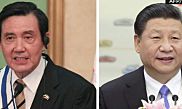Taiwan and China: Friends, foes or frenemies?
Divided by a sea channel and decades of bitter history, the leaders of China and Taiwan are set to meet in Singapore on Saturday for the first time since 1949.
The summit between Chinese President Xi Jinping and Taiwan President Ma Ying-jeou will be a historic event. Here's our guide to understanding why.
READ: Leaders set for historic meeting
Complicated history
Taiwan's official name is the "Republic of China" (ROC), tracing its founding to 1911 on the Chinese mainland after the collapse of China's last imperial dynasty.
The Nationalist Party, or Kuomintang (KMT), ruled China until 1949 when it was defeated by the army of the Communist Party of China (CPC) in a bloody civil war and fled to Taiwan, an island off the southeastern coast of mainland China.
Later that same year, Communist leader Mao Zedong declared the birth of the People's Republic of China (PRC) from Tiananmen Gate in Beijing.
The two sides have been governed separately since, though a shared cultural and linguistic heritage mostly endures -- with Mandarin spoken as the official language in both places.
Deliberate ambiguity
Decades of overt hostility across the Taiwan Strait eased in the early 1990s when representatives from Beijing and Taipei, after a historic meeting in Singapore, reached a deal to allow deliberate ambiguity on questions of sovereignty.
The "one China" policy, as it is known, allows both governments to claim sovereignty over mainland China and Taiwan -- but crucially neither recognizes the other's legitimacy.
China's state media are required to put quotation marks around all Taiwan government agencies and official titles, while Taiwan media often refer to the mainland authority as the "Chinese Communist regime."
The move paved the way for increasing economic and cultural cooperation.
Hot and cold
Ties have greatly strengthened in recent years, especially since Ma Ying-jeou of the KMT took office in 2008.
Businesses from Taiwan -- ranging from electronics manufacturers to instant noodle giants -- have invested billions of dollars in the mainland, home to more than 1.3 billion people and the world's second-largest economy.
Millions of mainland tourists have flocked to Taiwan after the resumption of direct flights -- although border controls don't accept each other's passports.
Political dialogue has largely stalled, however, as China remains a one-party state.
Taiwan, with a population of more than 23 million people, has become a vibrant democracy since the 1990s -- with the KMT and the opposition Democratic Progressive Party (DPP) trading victories in presidential elections.
U.S. stance
Thousands of miles away from Singapore, the United States will be keeping a close eye on the meeting Saturday.
Washington officially sticks to a "one China" policy, acknowledging Taiwan being part of China and the PRC's status as the sole legitimate government of China.
Although the U.S. embassy long ago moved to Beijing from Taipei -- Washington switched diplomatic recognition to the PRC in 1979 -- the island remains an important American ally in the region.
Despite strong protests from China, the United States continues to sell advanced weapons to Taiwan for its self-defense against a much bigger Chinese military.
"We believe cross-strait issues should be resolved peacefully in a manner, pace and scope acceptable to people on both sides of the strait," said Elizabeth Trudeau, a spokeswoman for the U.S. State Department on Tuesday, welcoming the news of the Xi-Ma meeting as a beneficial step.
Sensitive times
With the DPP candidate Tsai Ing-wen leading in public polls for the next presidential race in January, cross-strait relations are facing renewed uncertainty.
Her party has a pro-independence stance.
Already, DPP officials and other critics are questioning the timing of the Xi-Ma summit so close to the Taiwan election, calling it a desperate political move to boost the KMT's electoral fortunes.
To address political sensitivity and highlight mutual respect, Xi and Ma will refer to each other as "Mr." rather than their official titles during the summit.
China also seems to be more aware of the impact of its strategy in Taiwan itself, opting for talks and dinner rather than flexing military muscles.
Staging war games before Taiwan elections in the past has backfired for Beijing.
News Courtesy: www.cnn.com











